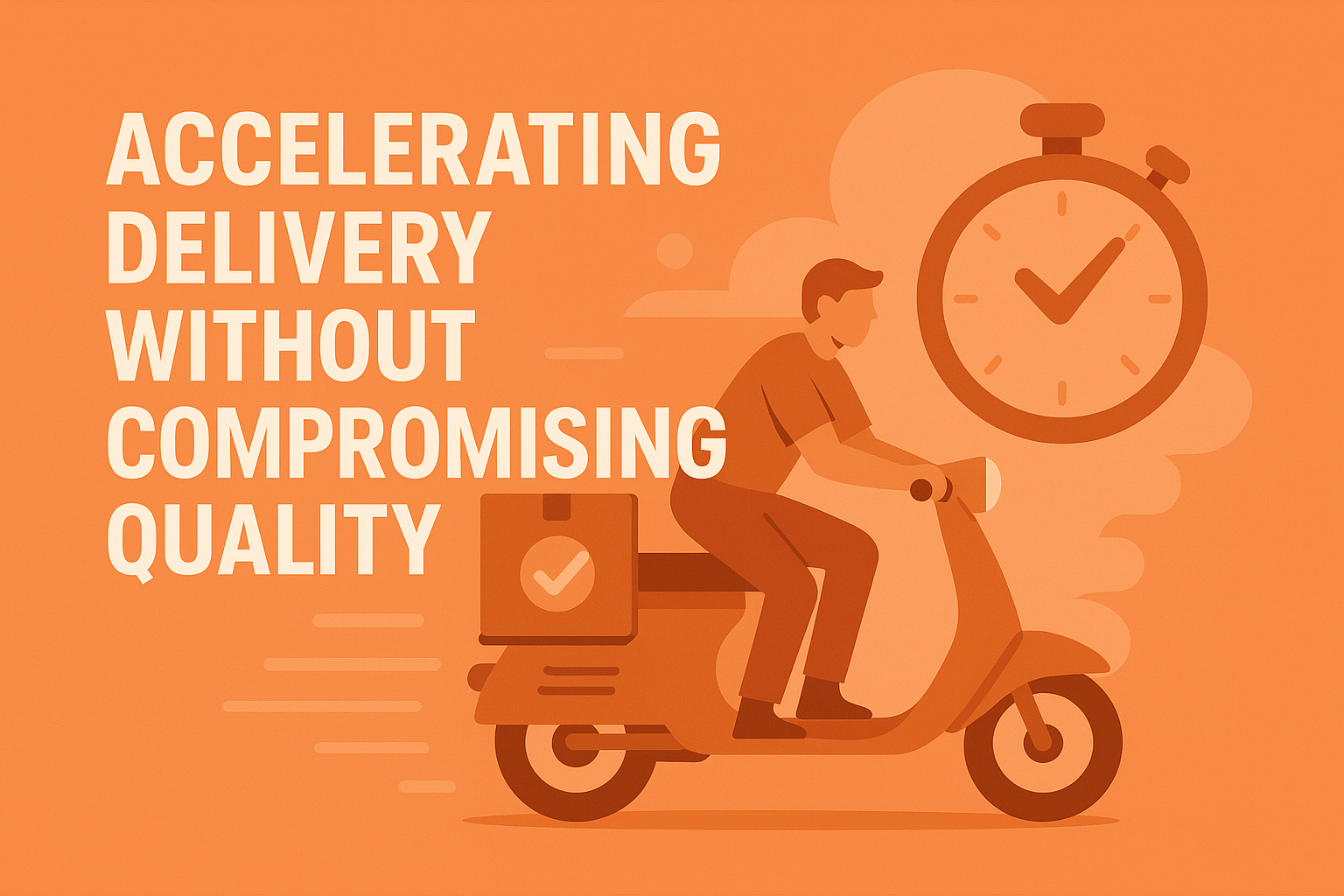Accelerating Delivery Without Compromising Quality. Rapid, Yet Robust

In the world of digital engineering, “faster” is often seen as the ultimate goal. Faster delivery to customers, faster feedback loops, faster time-to-value. But speed alone is meaningless - unless it’s matched with quality.
Too often, organisations fall into a false trade-off: believing that accelerating delivery must come at the expense of robustness, maintainability, or user experience. In reality, high velocity and high quality are not opposing forces. When engineered thoughtfully, they reinforce one another.
Accelerating delivery without compromising quality is not only possible - it’s a hallmark of modern, high-performing digital teams. It requires discipline, alignment, and a shift in how we think about engineering excellence.
Why Speed Without Quality is a False Economy
Pushing changes to production quickly can look like progress - until bugs surface, users complain, or outages occur. Then the real cost of poor quality emerges:
Rollbacks and hotfixes
Erosion of customer trust
Team burnout from firefighting
Slower delivery over time due to accumulating technical debt
In short, cutting corners to go faster eventually slows you down. Sustainable speed comes from building quality into every part of the development lifecycle - not bolting it on at the end.
The Real Enabler: Flow Efficiency
High-performing teams don’t achieve speed by doing more - they achieve it by reducing waste, friction, and unnecessary complexity. They optimise for flow efficiency: how smoothly and predictably work moves from idea to production.
Key practices that enable this include:
Smaller batch sizes (e.g. small pull requests, limited WIP)
Fast, automated feedback loops
Cross-functional collaboration to reduce handovers
Clear definition of done that includes testing, observability, and performance
Focusing on flow helps eliminate the delays and rework that typically compromise both speed and quality.
7 Ways to Accelerate Delivery and Improve Quality
✅ 1. Shift Testing Left
Embedding testing early - via unit tests, TDD, and integration checks - catches defects sooner, when they’re cheaper to fix. This prevents quality issues from creeping downstream and slowing teams at the worst possible time: near release.
✅ 2. Automate Where It Matters
Manual steps are slow, inconsistent, and error-prone. Invest in:
CI/CD pipelines for seamless deployment
Linting and static analysis for early code quality feedback
Security scanning integrated into the build process
Infrastructure as code to prevent drift and ensure repeatability
Automation increases both speed and reliability - reducing human error without slowing down delivery.
✅ 3. Use Feature Flags and Progressive Delivery
Instead of all-or-nothing releases, use feature toggles, canary deployments, and gradual rollouts. This allows teams to:
Test in production safely
Roll back quickly
Deliver incrementally
Gather real-world feedback without full exposure
These strategies help you move faster without increasing risk.
✅ 4. Invest in Observability
Good observability means your systems tell you what’s happening - fast. Metrics, logs, and traces help catch performance issues and errors early, so teams can respond before customers are affected.
This supports faster recovery and faster learning, reducing the fear of change.
✅ 5. Foster a Culture of Continuous Improvement
Encourage teams to reflect frequently (e.g. through retrospectives) and act on what they learn. Create psychological safety so that problems and ideas are surfaced early. Small, frequent improvements compound over time - and remove quality bottlenecks that slow teams down.
✅ 6. Empower Autonomous, Cross-Functional Teams
Teams that can own work end-to-end - with embedded testing, ops, security, and product - don’t wait on others to move forward. Reducing dependencies increases delivery speed and enables more accountable, higher-quality outcomes.
✅ 7. Measure What Matters
Track metrics that reflect both speed and quality, such as:
Lead time for changes
Deployment frequency
Change failure rate
Mean time to recovery (MTTR)
Customer-reported defects
These indicators help identify where improvements are needed - without over-indexing on velocity alone.
The Mindset Shift: From Speed Versus Quality to Speed Through Quality
The highest-performing engineering teams have made a fundamental mindset shift: they no longer view speed and quality as a trade-off. Instead, they treat quality as the enabler of sustainable speed.
They understand that:
Well-written, tested code is easier to deploy and maintain
Observability reduces fear and accelerates debugging
Automation speeds up safe, repeatable processes
Empowered teams deliver faster because they’re unblocked
Quality isn’t an extra step - it’s the foundation of flow
Key Takeaways
✅ Accelerating delivery doesn't mean cutting corners - it means optimising flow.
✅ Quality should be built in from the start, not inspected in at the end.
✅ Automation, observability, and continuous feedback are essential to moving fast and staying safe.
✅ Smaller changes, tighter loops, and empowered teams unlock both speed and stability.
✅ Speed through quality is not only possible - it’s how modern engineering teams thrive.
Final Word
In digital engineering, speed matters. But speed without quality is just technical debt waiting to happen. If we want to move fast and stay in control, we need to design systems, teams, and cultures that value learning, improvement, and craftsmanship.
Because the goal isn’t just to ship more software - it’s to ship valuable, reliable, and maintainable software, continuously.
That’s how we deliver faster. That’s how we deliver better. That’s how we deliver well.
Engineering leader blending strategy, culture, and craft to build high-performing teams and future-ready platforms. I drive transformation through autonomy, continuous improvement, and data-driven excellence - creating environments where people thrive, innovation flourishes, and outcomes matter. Passionate about empowering others and reshaping engineering for impact at scale. Let’s build better, together.
